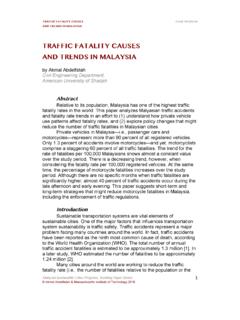Transcription of LOCATION FACTORS AND THEIR IMPORTANCE IN LOCATION …
1 EMI, Vol. 10, Issue 1, 2018. ISSN: 1804-1299 (Print), 1805-353X (Online). LOCATION FACTORS AND THEIR IMPORTANCE IN LOCATION . DECISION MAKING OF ENTERPRISES. (IN CONDITIONS OF SLOVAK REPUBLIC). CASE STUDY. 1 Martina Fuskov , 2 Denisa Han kov , 3 Monika Gub ov . Slovak University of Agriculture in Nitra, 1 Department of Statistic and Operation Research, 2 Department of Public Administration, 3 Department of EU Policies Abstract: Successfulness of enterprises is strongly linked to making the right LOCATION decisions. The aim of this article was focused on a presentation whether chosen LOCATION categories or LOCATION FACTORS are important in LOCATION decision of enterprises or not.
2 Data was obtained from 275 enterprises in 2015, based on a questionnaire survey. The survey was conducted in condition of the Slovak Republic. Enterprises were from three sectors of the national economy - primary, secondary and tertiary. Surveyed enterprises evaluated IMPORTANCE of various LOCATION FACTORS belonging to six main LOCATION categories by using scale from 0 to 4: 0 not important, 1 less important, 2 mediumly important, 3 . very important, 4 extremely important. We analysed 67 LOCATION FACTORS belonging to six LOCATION categories: (1) Labour, (2) Market, (3) land and natural resources, (4) Infrastructure, (5) Environment and (6) Law and socio-economic conditions.
3 Results show that the most important LOCATION categories are (2) Market and (1) Labour. From the (2). Market category, these are the most important: Intensity of competition in the sector, Knowledge of the local business environment and Purchasing power of households. From category (1) Labour, these are significant: Qualified workforce supply and Flexibility of the workforce. On the other hand, the category of (3) land and natural resources was identified as the most irrelevant in LOCATION decision making. Key words: allocation of the enterprise, LOCATION factor, localization process JEL: D70, R30, O52.
4 1 Introduction Localization in the corporate setting is the extent to which expatriate managers are replaced by local employees originally held by expatriate managers. Also, company support and top management's commitment as two sets of FACTORS that predicted localization success (Law, Song, Wong and Chen, 2009). A major operational decision is a LOCATION strategy, which is the process of determining where an organisation should put its facility and how the organisation should determine this decision. Such a decision has typically long-term implications and is very difficult to reverse.
5 In general, although there are similarities among the various organisations when choosing a LOCATION , each company choses a locale for reasons specific to THEIR industry (Maier, T dtling, 1997 and Smith, Clinton, 2009). Cantwell (2009) states, that in the early development of the international business field, the focus of attention moved from the country level to the firm level, and the interest in LOCATION issues declined. More 5. EMI, Vol. 10, Issue 1, 2018. ISSN: 1804-1299 (Print), 1805-353X (Online). recently, firm-based research itself has become increasingly concerned with the study of firm- LOCATION interactions.
6 The basic objective of LOCATION of the businesses is to determine the placement of the entities in the concrete area. Then, the company has to decide what will be its field of entrepreneurship and after that may be classified to a specific business sector production. Parmer (2002) claims, that the LOCATION of the economic activity means the activities related to production, exchange and consumption of goods, services and information on the rotating earth and universe. The LOCATION where these activities take place is called the LOCATION of economic activity.
7 Cambers, Currie (2002) state that the FACTORS influencing the LOCATION of economic activities vary. The enterprises or business companies often weigh up the advantages and disadvantages of a number of locations before deciding where to build. Maier, T dtling (1997) define localization FACTORS as certain forces that influence the process of localization of the enterprises in the area. Localization factor means an advantage, which is obtained if the enterprise locates at the certain place and not at another. Economically, this advantage means cost savings.
8 Establishment of a LOCATION with the best LOCATION FACTORS promises the most favourable conditions for THEIR activities. These conditions represent a summary of the economic, social, legislative, technical, natural and many other attributes specific to the territory. Finding acceptable locations is based primarily on identifying important LOCATION FACTORS . The term LOCATION is defined as placing a business, facility or group of facilities of a specific size and type in an area (Budner, 2004). A LOCATION of an enterprise emerges as a significant source of competitive advantage.
9 The theory of LOCATION may be considered both in microeconomic and macroeconomic terms. In microeconomic terms, the LOCATION theory applies to an enterprise which, in consideration of its costs and benefits, is searching for the best LOCATION for its business. The theory of LOCATION in macroeconomic terms forms a part of broadly understood spatial economy. The theory is based on the assumption that production costs and income of an enterprise are dependent on its LOCATION (Szyma ska, P aziak, 2014). At the beginning of 20th century, German economist A.
10 Weber in his work first dealt with FACTORS influencing the LOCATION of the enterprise. He introduced the concept of localization factor into economic theory. He distinguished three LOCATION FACTORS : a Transport factor, a Labour factor and an Agglomeration factor (Weber, 1929). A choice of LOCATION for the enterprise is one of the key decisions in terms of strategic planning. Such a decision is not made often. It is made particularly in the establishment of the enterprise, in case the enterprise has increasing demand for products or services, in expanding into new markets (V rostov , 2010).







